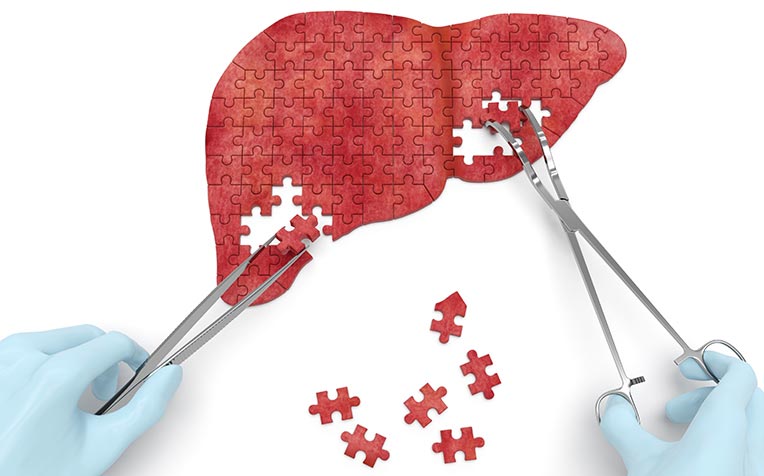
Liver cirrhosis (liver scarring) patients can benefit from several treatment types with transplant as a last option.
Treatment of liver cirrhosis (liver scarring)
Patients with liver cirrhosis (liver scarring) will benefit from the following treatments, which include:
1. Treatment of the underlying cause of liver cirrhosis (liver scarring):
- Patients with alcoholic liver cirrhosis must stop all intake of alcohol.
- Patients with chronic hepatitis B and C should be started on antiviral treatment if there are no reasons to withhold such treatment.
- Patients with autoimmune hepatitis may require treatment with steroids.
2. Treatment of portal hypertension to reduce risk of variceal bleeding by:
- Non-selective beta blocker medication (e.g. propranolol) for lowering of portal pressure to reduce risk of bleeding from abnormally dilated blood vessels (variceal bleeding).
- Endoscopic ligation (banding) of oesophageal varices to treat acute bleeding or prevent future variceal bleeding.
- Endoscopic sclerotherapy (histoacryl injection) of gastric varices to treat acute bleeding.
3. Treatment and prevention of ascites include:
- Maintenance of a strict low salt diet.
- Maintenance diuretic medication (e.g. spironolactone or furosemide) to remove excess fluid from the body.
- Patients who have persistent ascites that do not respond to medications may require paracentesis, Transjugular Intrahepatic Portosystemic Shunt (TIPS) or liver transplant.
4. Treatment and prevention of hepatic encephalopathy include:
- Regular bowel clearance in order to reduce build-up of toxins in the bloodstream that may cause encephalopathy (a disease that affects the function or structure of your brain).
- Avoidance of sedatives that may worsen encephalopathy.
5. Liver cancer surveilance:
- Patients with cirrhosis should undergo regular abdominal ultrasound and alfa-fetoprotein (AFP) blood tests at least once every six months.
6. Treatment of cirrhosis-related infections
- Cirrhotics need to be closely monitored for infections (e.g. spontaneous bacterial peritonitis, which is infection of water retention in the abdominal cavity) and should be referred for early treatment with antibiotics.
7. Early assessment for liver transplant:
- Cirrhotic patients who develop decompensation signs and symptoms should be referred for liver transplant.
“In cases that are more severe, for example where the liver can barely function because it’s badly scarred, then a liver transplant may be the only option for the patient,” says Clinical Assistant Professor Tan Hiang Keat, Senior Consultant from the Department of Gastroenterology & Hepatology at Singapore General Hospital (SGH), a member of the SingHealth group.
Ref: Q15
Check out other articles on liver health:
Fatty Liver: What You Need to Know
How to Reverse Fatty Liver Disease
Liver Inflammation: What Causes It and How to Prevent
Contributed by
















 Get it on Google Play
Get it on Google Play